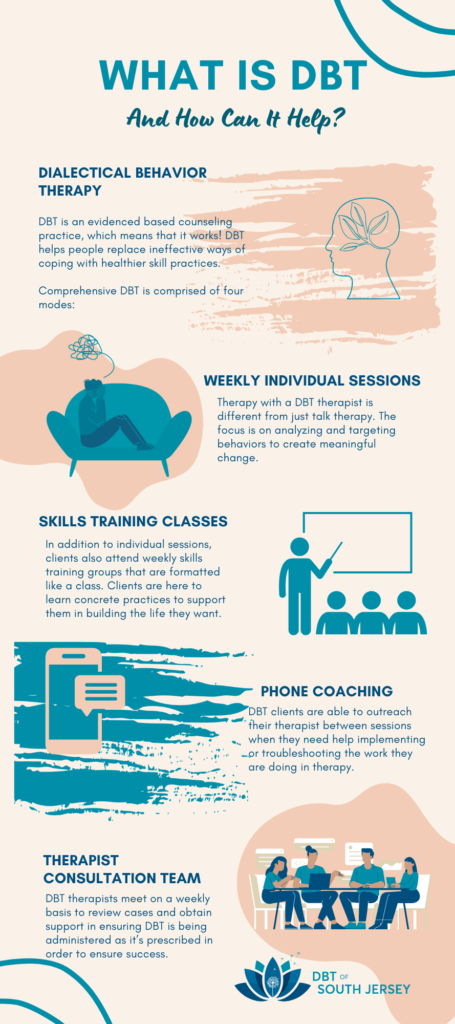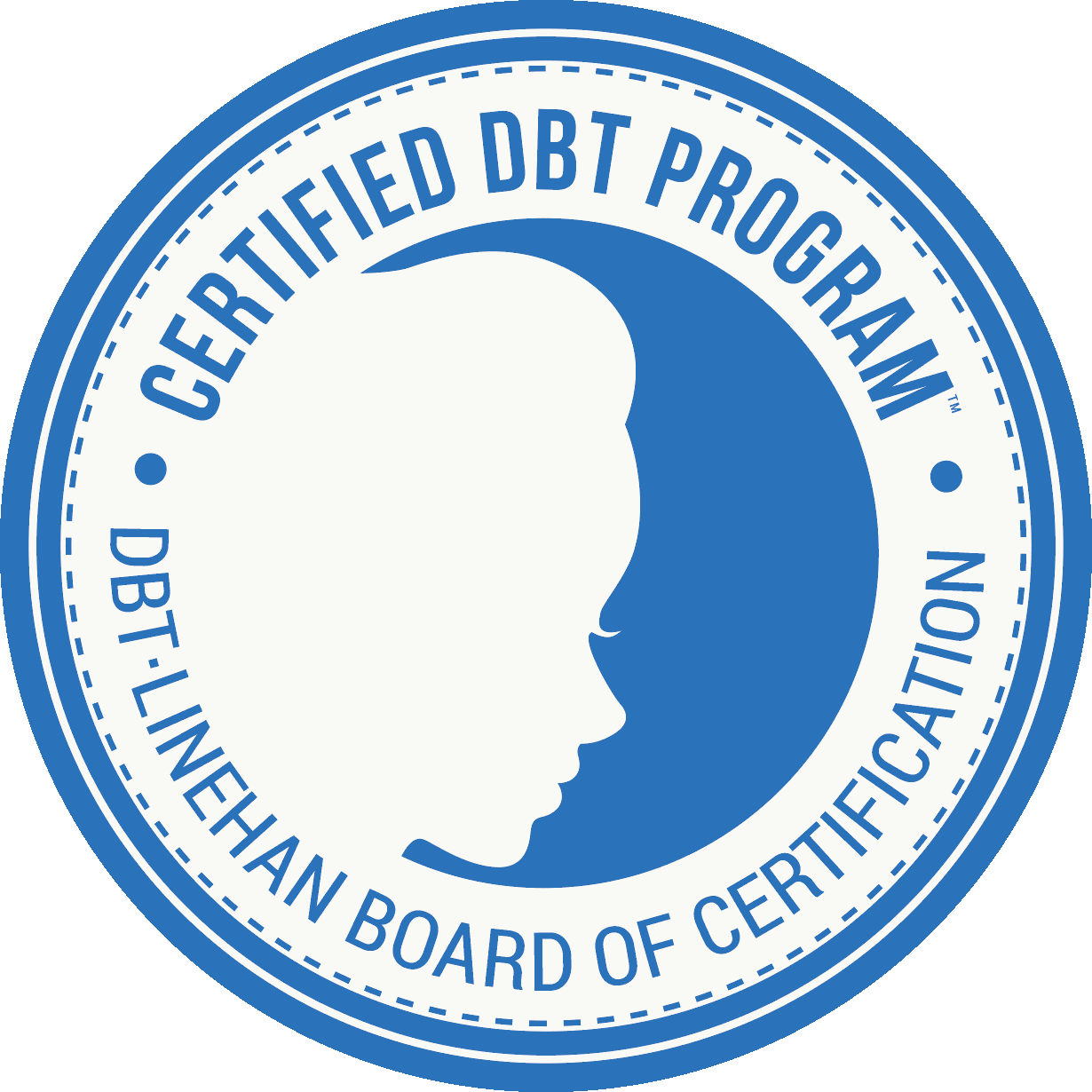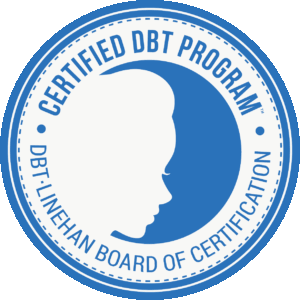What’s DBT?
What’s DBT?
Dialectical Behavioral Therapy (DBT) is an evidenced based behavioral treatment, which means there is research to prove its effectiveness. DBT was originally created in the early 90s by Dr. Marsha Linehan as a treatment for suicidal individuals diagnosed with Borderline Personality Disorder. DBT combines elements of Cognitive Behavioral Therapy with Zen principles of mindfulness and compassion. In it's comprehensive model, it includes 4 parts: Individual Therapy, Skills Group, Phone Coaching & Consultation Team.
DBT has since evolved along with the populations treated. Dr. Linehan found that DBT was an effective therapy to treat individuals that had a history of failed therapy, hospitalizations and other treatments. Research and literature on borderline personality disorder has also evolved, in that many clinicians believe BPD is a product of complex post-traumatic stress disorder, or chronic and pervasive invalidation. In other words, difficulty with mood regulation, excessive self criticism or problems related to self image, patterns of unstable relationships, impulsive or self destructive behavior, and trouble with anger-all make sense given certain biological vulnerabilities in addition to an invalidating environment that is unable to meet the needs of the individual. Similarly to changes of the stigma that has been associated with BPD, post-traumatic stress disorder is no longer seen as a disorder only impacting veterans. You or your loved one may be struggling with symptoms and have no understanding as to why; though we believe that given all experiences leading up to now, everything makes sense.
Regardless of the diagnosis, DBT of South Jersey is interested in addressing your symptoms. Unfortunately, you could receive several different diagnoses along the course of your lifetime, and though it can help to point you in the right direction for treatment, labels can also be limiting.

How Does DBT Work?
DBT as an evidenced based treatment is designed to run as a comprehensive model that includes 4 modes:
The focus in 1:1 weekly therapy is on analyzing and targeting behaviors to create meaningful change. It’s distinctly different than just talk therapy.
Skills Groups have a classroom feel and are designed to increase you concrete skills in the areas of mindfulness, distress tolerance, emotion regulation and interpersonal effectiveness.
Designed to generalize what is being learned in therapy to your everyday life. Provided by your individual therapist via phone calls or text messages. They are not full therapy sessions, but spot coaching to help you put your learned skillfulness to practice.
Your therapist meets with other DBT therapists to ensure they are giving the best care for you or your family member in accordance with the DBT model.
We would love to support you.
Who Can DBT Help?
If you or your loved one is experiencing any of the following, he or she may benefit from receiving comprehensive DBT:
- Depressed Mood – lack of energy, irritability, lack of self worth, crying spells, loss of interest, over sleeping or sleep depravation, hopelessness etc.
- Anxious Mood – panic attacks, irritability, constant feelings of worry, etc.
- Eating Disorder Symptoms – binge eating, restricting, purging, poor body image, emotional eating, etc.
- Post Traumatic Stress Symptoms – avoidance of trauma related stimuli, hypervigilance, hyperstartle, nightmares, reliving the traumatic event through flashbacks or unwanted memories, difficulty trusting others, etc.
- Impulsivity – suicidal thinking, unsafe or risky behaviors such as sexual acting out, over spending or substance abuse
- Problems with regulating emotions – you may feel emotions such as anger or fear very quickly, intensely, then it takes awhile before you come back down to your baseline
- Relationship chaos – trouble with staying in relationships that are healthy and supportive, difficulty with communication, having all or nothing patterns of thinking that are reflected in relationships, problems with setting limits
- Problems in the mind – self doubt, constant worry, racing thoughts, black and white thinking, living in the past or being stuck in “what-if” scenarios
- A history of multiple failed treatments/attempts in therapy or hospitalizations
Adherent vs. Informed DBT Models
DBT of South Jersey is a practice that operates an adherent model of DBT. Adherence or Comprehensive DBT, means that the treatment providers are adhering to the model, running DBT the way it was designed, to keep in line with effective treatment that works (to keep the treatment evidenced-based). Additionally, all therapists here have foundational training in DBT (which is a 40hr comprehensive training in the model.)
A DBT informed practice means that the client is not receiving all 4 modes of treatment, or that they are receiving an abbreviated form of the treatment based on their needs. A DBT informed clinician means they do not have foundational DBT training, nor a DBT Team to consult with, but may incorporate pieces of the model into their sessions, according to their clinical discretion and the needs of the client.
Not all clients need the comprehensive model.
We share this information so you can be informed about the levels of DBT adherence within practice models, as well as the levels of DBT training a clinician may have.
DBT Linehan Board Certified Program
DBT of South Jersey is just one of two Linehan Board Certified Programs in the state of New Jersey and one of less than 40 Certified Programs Globally. This is a huge accomplishment that our team worked on together for nearly two years.
Achieving DBT Linehan Board Certification signifies that a therapy program has met the rigorous standards set by the Linehan Board of Certification which was founded by Dr. Marsha Linehan, the developer of Dialectical Behavior Therapy (DBT).
This certification ensures that the program provides DBT in a manner that adheres to the highest standards of treatment fidelity and clinical expertise.

A DBT Linehan Board Certified Program has been independently evaluated by experts in the field and confirmed all the elements are present to provide adherent, comprehensive DBT. This matters most for clients, families, and consumers because it increases the chances they are getting adherent, research-supported DBT treatment.




